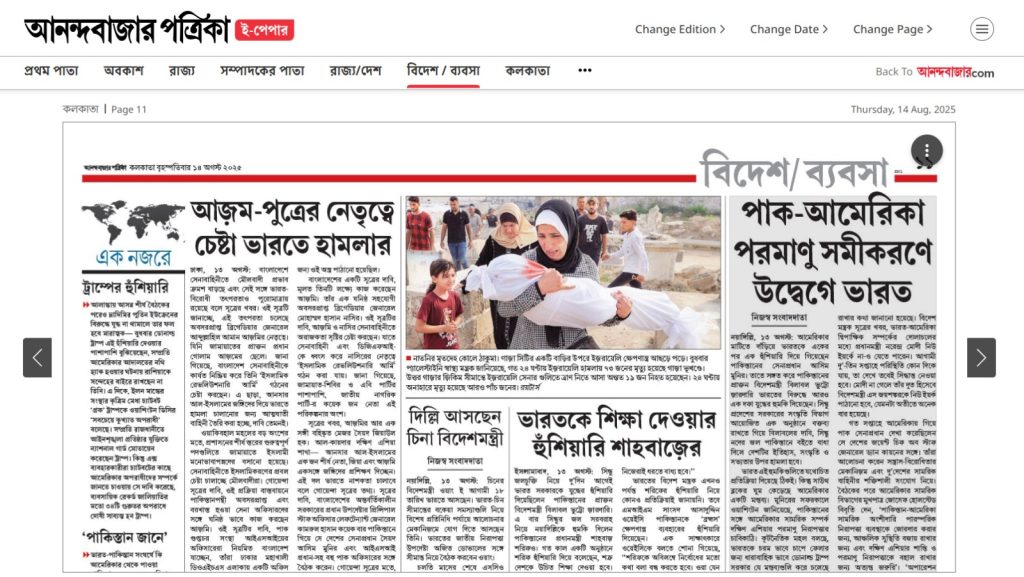The Bangladesh chapter of Pakistan Jamaat-e-Islami has never apologised for their role in committing genocide in 1971 as collaborators of the Pakistani Army, nor do they boast about the bravery that they were right in committing such heinous crimes against the Bengali nation, though they hate this race and the secular fabric of our society.
Jamaat’s former amir and top razakar, Ghulam Azam, also didn’t dare defend their crimes in public. He covertly campaigned against the independent Bangladesh for several years till the assassination of Bangabandhu Sheikh Mujibur Rahman on August 15, 1975. He returned to Bangladesh with a Pakistani passport, regrouped Jamaat, but couldn’t regain citizenship until 1992.
Demand for return to East Pakistan, led by Yunus-Azmi, growing in Islamabad, Dhaka
How Yunus gang is trying to weaken the Bangladesh Army
Ghulam Azam’s son, Abdullahil Amaan Azmi, was commissioned in the Bangladesh Army by concealing his Pakistani identity in 1981. He has been working closely with the Pakistani ISI and jihadist elements to take the country back to the East Pakistan era since the fall of the Awami League government last year. Resurfacing on August 7, Azmi crafted a story of being in solitary confinement for eight years after being kidnapped by law enforcers.

Although the Pakistani media is praising him for his loyalty, India- and Hindu-hater Azmi is hesitant to admit what he and his cohorts are up to with a view to destroying the army and DGFI, training al-Qaeda jihadists and members of the Rohingya refugee communities and the stranded Pakistanis to destabilise the Seven Sisters in India’s northeast.
Brig Azmi’s Dark Plan: Islamizing army, unleashing suicide squads on India
Pakistan Army officers land in Dhaka, will sit with Arakan Army
He has hit back at the Anandabazar Patrika and Bangladeshi journalist Monjurul Alam Panna in a Facebook post for revealing the ISI’s sinister plan centering on Bangladesh and India’s eastern border, using Azmi, who had his dismissal order revoked and was sent on retirement with benefits last year.
In the post shared on Wednesday, Azmi labeled Panna, a former journalist of Ekushey TV now running a YouTube channel for news and views, as an agent of the Indian intelligence agency, RAW.
Panna’s crime was talking about the blueprint of jihadist activities by Azmi as published by the popular Indian newspaper.
“Arrangements are being made to give them a devastating response,” Azmi said, terming the journalist and the Anandabazar Patrika enemies of Bangladesh.
“I have always been and still am vocal against the anti-Bangladesh misdeeds and activities of hegemonic India. For this reason, India (RAW) and their domestic and foreign agents have always been and still are angry with me. This is reflected in the false propaganda in my name in Indian newspapers and their agents’ jumping around in propaganda by mixing juice in it.”
Azmi’s post was later shared by Major (sacked) Syed Ziaul Huq Zia, the fugitive kingpin of Ansar al-Islam (al-Qaeda’s Bangladesh affiliate) and mastermind behind the murder of US citizen Avijit Roy. Zia recently lent support for the rebels in Manipur, Khalistan, and Kashmir by offering them to open offices in Bangladesh and destabilise India.
Rights activists have expressed concern over Azmi’s Facebook post because of his links to the ISI and jihadists and a culture of government-sponsored mobocracy, which raises grave concerns for the safety of journalist Panna.
Bangladesh: A hell for journalists
The people of the country have witnessed unprecedented incidents of mob attacks, looting, and arson at media offices in an organised way since last August. At least 11 journalists were killed and over 500 were injured in targeted attacks in the past year.
Since the first hours, over 1,000 journalists across the country, including in Dhaka, have been dismissed from their jobs, and editors of eight newspapers and news chiefs of 11 private television channels have been removed so far.
The membership of hundreds of journalists has been suspended, cancelled, or expelled from press clubs across the country.
Then, for the first time in the country’s history, the regime revoked 168 press accreditation cards, barring their access to key installations like the Secretariat. Then it issued temporary cards to new journalists.
In the first 11 months, at least 412 journalists have been implicated in criminal cases, including 266 for murder, and under the repressive Cyber Security Ordinance. Currently, 39 journalists are behind bars.